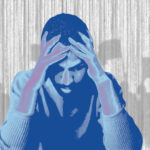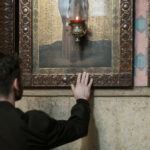Ever used the phrase “Already / Not Yet” to describe the timing of God’s kingdom? If so, you’re indebted to George Eldon Ladd, longtime professor at Fuller Seminary and one of the most influential evangelical scholars of the 1900’s.
Ladd broke through the sterile debates about whether the kingdom of God was a present, spiritual reality or a future, earthly reality. He popularized a view of the kingdom as having two dimensions: “already/not yet.” Ladd was also one of the first solid evangelical scholars to go outside the fundamentalist camp in order to interact with liberal scholars in the academy, men like Rudolph Bultmann.
For a biographical overview of Ladd’s life and work, I suggest A Place at the Table: George Eldon Ladd and the Rehabilitation of Evangelical Scholarship in America. See my review of this book here:
A Place at the Table is much more than a biographical sketch of Ladd’s life. D’Elia cautiously enters into the theological discussion he describes in order to spotlight Ladd’s contributions to evangelical scholarship and his interactions with scholars from outside the evangelical world. Those who read D’Elia’s book will receive an education, not merely regarding the historical aspects of Ladd’s interesting life, but also regarding the theological debates of the time.
I’ve also interviewed Ladd’s biographer, John D’Elia, about his work and his legacy:
Ladd’s legacy within evangelical scholarship is hard to overstate. I argue in the book that he carved out a place for evangelicals in what was then the threatening and bewildering world of critical biblical scholarship. By demystifying the methods of critical scholarship, Ladd made them available to evangelicals who wanted to use them in their study of the Scriptures. Historic premillennialism, then, is really an incidental part of Ladd’s story. The real achievement in Ladd’s career can be found in the wide range of biblical scholars who sat at his feet and then went on to make their own mark. Those scholars are as diverse as John Piper and Robert Mounce on the
one side, and Eldon Epp and Charles Carlston on the other.
If you’re going to start reading Ladd, let me suggest his book, The Gospel of the Kingdom: Scriptural Studies in the Kingdom of God. Check out my review here:
The Gospel of the Kingdom is illuminating, clarifying and (thankfully) brief. It is amazing that Ladd manages to fit all of this great theological teaching into 140 pages.
There is a reason this book is still in print. It is unmatched in its clarification of what the kingdom of God is, and how the kingdom of God can be already present but not yet here in its fullness.
I’ll close this post with Ladd himself. Here are two ways Ladd defined “the gospel,” one personal and the other in light of God’s kingdom:
“I can only bear witness at this point to what Heilsgeschichte means to me. My sense of God’s love and acceptance is grounded not only in the resurrected Christ but also in the Jesus of history. He taught something about God that was utterly novel to his Jewish auditors: that God is not only gracious and forgiving to the repentant sinner but is also a seeking God who, in Jesus’ person and mission, has come to seek and to save the lost…
God has shown me that he loves me in that while I was yet a sinner, Christ died for me (Rom. 5:8). This is not faith in history; it is not faith in the kerygma; it is not faith in the Bible. It is faith in God who has revealed himself to me in the historical event of the person, works and words of Jesus of Nazareth who continues to speak to me though the prophetic word of the Bible.”
– George Eldon Ladd, “The Search for Perspective,” Interpretation 25 (Jan. 1971), 56 and 57.
“This is the good news about the kingdom of God. How men need this gospel! Everywhere one goes he finds the gaping graves swallowing up the dying. Tears of loss, of separation, of final departure stain every face. Every table sooner or later has an empty chair, every fireside its vacant place. Death is the great leveller. Wealth or poverty, fame or oblivion, power or futility, success or failure, race, creed or culture — all our human distinctions mean nothing before the ultimate irresistible sweep of the scythe of death which cuts us all down. And whether the mausoleum is a fabulous Taj Mahal, a massive pyramid, an unmarked spot of ragged grass or the unplotted depths of the sea one fact stands: death reigns.
“Apart from the gospel of the kingdom, death is the mighty conqueror before whom we are all helpless. We can only beat our fists in utter futility against this unyielding and unresponding tomb. But the good news is this: death has been defeated; our conqueror has been conquered. In the face of the power of the kingdom of God in Christ, death was helpless. It could not hold him, death has been defeated; life and immortality have been brought to life. An empty tomb in Jerusalem is proof of it. This is the gospel of the kingdom.”
– from The Gospel of the Kingdom

















